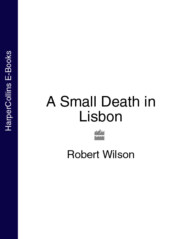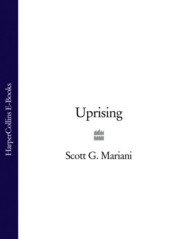По всем вопросам обращайтесь на: info@litportal.ru
(©) 2003-2024.
✖
The Blind Man of Seville
Автор
Год написания книги
2018
Настройки чтения
Размер шрифта
Высота строк
Поля
‘Would it serve any purpose other than to frighten her to death?’
‘She has had three children with your father.’
‘I couldn’t believe it when I heard.’
‘How did you hear?’
‘My father dropped me a line whenever one appeared.’
‘She had to force him into it. It was a condition of their marriage.’
‘That’s understandable.’
‘She also told me that he was obsessively security conscious. He installed a very serious door in the apartment and made it his business to lock it every night.’
Jiménez stared down at his desk.
‘She told me something else which should interest you …’
Jiménez’s head came up on a very tired neck. There was a trace of fear in his eyes. He didn’t want to hear anything that might demand more revision of his newly constructed view of events. Falcón shrugged to let him off the hook.
‘Tell me,’ he said.
‘First, she believed her gregarious restaurateur husband, with his collection of smiling photos, to be a man in the grip of abject misery.’
‘So it did get him in the end,’ said Jiménez, with no satisfaction. ‘But he probably didn’t know what it was.’
‘The second thing was a detail of the will. He left some money to his favourite charity, Nuevo Futuro — Los Niños de la Calle.’
Jiménez shook his head, in sadness or denial of the fact, it was difficult to tell. He came round to Falcón’s side of the desk and opened the door. He walked his sled-dragging walk down the corridor. Had he walked differently before his analysis? thought Falcón. Maybe he’d been stooped then, as under a weight, and now at least the baggage was behind him. Jiménez produced Falcón’s coat, helped him into it. A single question rocked in the balance of Falcón’s mind. To ask it or not?
‘Has it ever occurred to you,’ said Falcón, ‘that Arturo might still be alive? Forty-two years old he’d be by now.’
‘It used to,’ he said. ‘But it’s been better for me since I achieved a sense of finality.’
10 (#ulink_d2c115dc-f788-5901-9c57-32616d71a264)
Friday, 13th April 2001, the AVE Madrid-Seville
Even this AVE, the late one, which wouldn’t get into Seville until after midnight, was full. As the train shot through the Castillian night, Falcón brushed the crumbs of a bocadillo de chorizo from his lap and stared out of the window through the transparent reflection of the passenger opposite him. Thoughts trickled through his mind, which was tired but still racing from the intrusions he’d made into the Jiménez family.
He’d left José Manuel Jiménez at 3 p.m., having asked if he’d mind him visiting Marta at the San Juan de Dios mental institution in Ciempozuelos, forty kilometres south of the city. The lawyer warned him that it wasn’t likely to be a productive meeting but agreed to phone ahead so that he’d be expected. Jiménez had been right, but not for the reasons he’d thought. Marta had had a fall.
Falcón came across her in the surgery having a couple of stitches put in her eyebrow. She was ashen, which he supposed could have been her normal colouring. Her hair was black and white, wound up and pinned in a bun. Her eyes were set deep in her head and their surrounds were charcoal grey with large purple quarter-circles that reached the top of her cheekbones. It could have been bruising from the fall, but had a more permanent look to it.
A Moroccan male nurse was sitting with her, holding her hand and murmuring in a mixture of Spanish and Arabic, while a female junior doctor stitched the eyebrow which had bled profusely, spattering the hospital-issue clothing. Throughout the operation she held on to something attached to a gold chain round her neck. Falcón assumed it was a cross, but on the one occasion that she released it he saw there was a gold locket and a small key.
She was in a wheelchair. He accompanied the nurse as he pushed her back to the ward, which contained five other women. Four were silent while the fifth maintained a constant murmur of what sounded like prayer but was in fact a stream of obscenities. The Moroccan parked Marta and went to the woman, held her hand, rubbed her back. She quietened.
‘She always becomes agitated at the sight of blood,’ he explained.
The Moroccan’s name was Ahmed. He had a degree in psychology from Casablanca University. His good nature and openness iced over visibly when Falcón showed him his police ID.
‘But what are you doing here?’ asked Ahmed. ‘These people don’t go out. They’re permanent residents, barely capable of the simplest of things. Beyond the gates is as good as another planet to them.’
Falcón looked down on Marta’s salt-and-pepper head, the white pad over her eyebrow, and an immense sadness broke inside his chest. Here was the real casualty of the Jiménez story.
‘Does she understand anything of what we say?’ he asked.
‘It depends,’ he said. ‘If you talked about C-A-T-S, she might react.’
‘What about A-R-T-U-R-O?’
Ahmed’s face settled into a bland wariness, which Falcón had seen before in immigrants under police questioning. The blandness was to minimize any irritation in the officer, the wariness to combat intrusive questioning. It was an attitude that might have worked with Moroccan police, but it annoyed Falcón.
‘Her father has been murdered,’ he said quietly.
Marta coughed once, twice and the third was followed by a stream of vomit, which pooled in her lap and dripped to the floor.
‘She’s in shock from her fall,’ said Ahmed, and moved away.
Falcón sat on the bed, his face level with Marta’s. Vomit clung to some hairs on her chin. She was panting and not looking at him. Her hand still held the locket. Ahmed returned with new clothes and cleaning equipment on a trolley. He screened Marta off. Falcón sat across the room to wait. Under her bed was a small, padlocked metal trunk.
The screens were pulled back and Marta reappeared in new clothes. Falcón walked with Ahmed as he pushed his trolley.
‘Have you ever talked to her about Arturo?’
‘It’s not my job. I’m qualified, but only in my own country. Here I am a nurse. Only the doctor talks to her about Arturo.’
‘Have you been present?’
‘I have not been in attendance, but I have been there.’
‘What’s her reaction to the name?’
Ahmed performed his cleaning tasks on automatic.
‘She becomes very upset. She brings her fingers to her mouth and makes a noise, a kind of desperate pleading noise.’
‘Does she articulate anything?’
‘She is not articulate.’
‘But you spend more time with her, maybe you understand her better than the doctor.’
‘She says: “It wasn’t me. It wasn’t my fault.”’
‘Do you know who Arturo is?’











